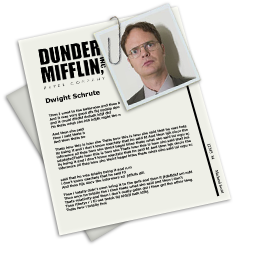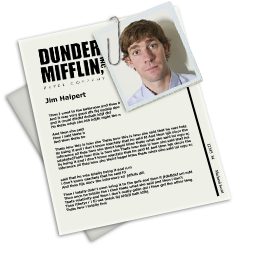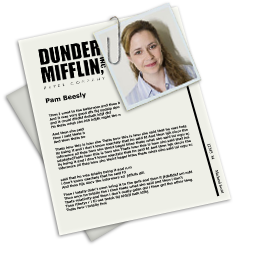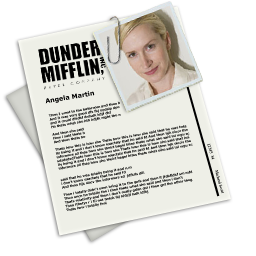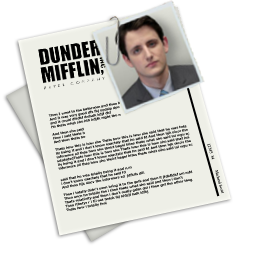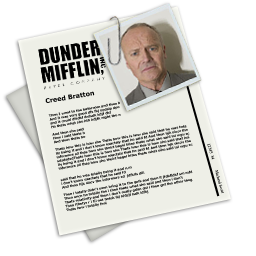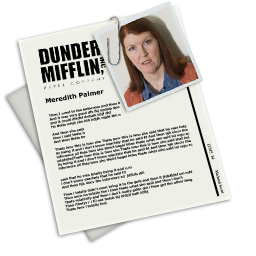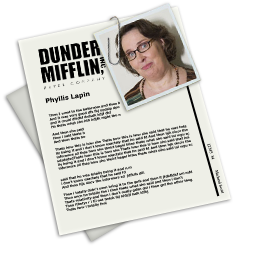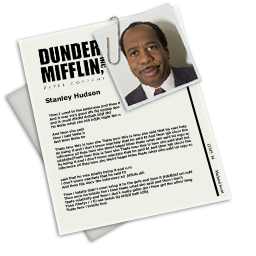The Economics of The Office
Learning economics from the world's best boss
Huge Turnaround for Profit
Dwight corners the market on Princess Unicorn dolls! This is a good opportunity to discuss the relationship between expected future prices and changes in demand. Dwight knew that the demand for these dolls would increase as Christmas drew closer. Advanced students should be able to draw a supply and demand graph for this market and see that in the very short run the supply of this good is perfectly inelastic in the Scranton area. This makes the profit opportunity for Dwight even greater.
Season 5 Episode 11 "Moroccan Christmas"
Information and Market Efficiency (G14) Microeconomic Behavior: Underlying Principles (D01)
Performance Review
In this clip (found only on the deleted scenes sadly), Dwight attempts to justify the raise he feels he deserves. Dwight correctly identifies the relationship between inflation and his real wage. If Dwight’s nominal wages do not increase at least at the rate of inflation the real purchasing power of his wages will fall!
Season 2 Episode 8 "Performance Review"
Babysitter
In this clip, Jim and Pam discuss how difficult it is to find a good babysitter for their kids. They are only willing to hire a babysitter with highly specialized skills. Therefore, they should be expected to pay a premium price for a sitter. It's not that there is a shortage of available babysitters as much as there is a shortage of sitter who have demonstrated the skill set they think is required.
Season 4 Episode 3 "Andy's Play"
Information and Market Efficiency (G14) Microeconomic Behavior: Underlying Principles (D01)
Landlord Dwight
When Dwight becomes the office's landlord he sets up a coffee shop in the foyer and installs motion sensors on the lights. Dwight is able to charge high prices in the coffee shop because its location gives him monopoly power. His efforts to cut costs are an example of incentives at work.
Microeconomic Behavior: Underlying Principles (D01) Production and Cost (D24) Monopoly (D42)
Search Committee Part 1
The office puts together a search committee to hire a new boss. One candidate (played by Warren Buffet), negotiates for a higher wage and then asks about job perks. A good example of bargaining and the principal-agent problem that arises in the workplace.
Season 7 Episode 24 "Search Committee"
Commission Cap Part 1
Jim loses his incentive to work when corporate institutes a cap on commissions.
Season 7 Episode 9 "WUPHF.com"
Microeconomic Behavior: Underlying Principles (D01) Compensation Packages (J33) Wage Level and Structure (J31)
Commission Cap Part 2
After Jim loses his incentive to sell, he looks for other ways to fill his time. A good example of incentives.
Season 7 Episode 9 "WUPHF.com"
Microeconomic Behavior: Underlying Principles (D01) Wage Level and Structure (J31) Compensation Packages (J33)
Commission Cap Part 3
After Jim loses his incentive to sell, he starts bothering his colleagues looking for ways to kill time.
Season 7 Episode 9 "WUPHF.com"
Microeconomic Behavior: Underlying Principles (D01) Wage Level and Structure (J31) Compensation Packages (J33)
Commission Cap Part 4
After Jim loses his incentive to sell, he pranks Gabe.
Season 7 Episode 9 "WUPHF.com"
Microeconomic Behavior: Underlying Principles (D01) Wage Level and Structure (J31) Compensation Packages (J33)
The Incentive
When Andy becomes the new manager, he institutes a 'points system' to incentivize the office to sell more paper. His plan works better than expected when he offers to tattoo himself as the grand prize. This clip is a funny example of the power of incentives.
Season 8 Episode 2 "The Incentive"
Labor Productivity (J24) Microeconomic Behavior: Underlying Principles (D01) Compensation Packages (J33)
